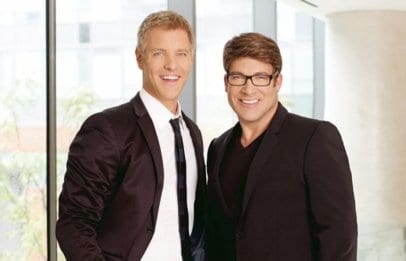When I die, there will definitely be some people dancing quite openly on my grave — and a lot of them will be gay. That’s because I have expressed many radical opinions and admitted proudly that I am a sexually promiscuous drag queen.
The same cannot be said of Chris Hyndman.
In fact, since his tragic death on Aug 4, 2015, many have stepped forward to publicly mourn Hyndman — who was only 49 years old — and to sing his praises.
I think it’s very important to talk about this.
First, let me say that I am very sorry to hear that Chris Hyndman is dead. He was a brave man to come out on television in a homophobic society.
But though the official response to Chris Hyndman’s death may be to praise him, I’ve received a barrage of texts and emails of another kind altogether from friends. Many seem to harbour secret suspicions about the cause of his death. Gay men are all atwitter. I know that I’m not supposed to talk about this; but everyone is. I happen to think that Chris Hyndman’s death is very much wrapped up in our hopes and dreams of who we are as gay people, and attention must be paid — not only to his passing, but to what the gay and lesbian community are making of it.
Why is Chris Hyndman’s death so important to gay men and lesbians in Toronto (and I suspect, many other places too)? Well, first of all, there are hardly any out-of-the-closet actors in movies or television. So Chris Hyndman cannot help but become — in death — a significant role model for us as queer people, whether he would have wished it or not. There is simply no one else who fits the bill. Secondly, Chris Hyndman and his partner Steven Sabados were a very visible example of a very new cultural phenomena: the married gay couple. And we all know what’s going on in the gay and lesbian community these days.
We all imagine that if we can be married, have kids, and lead the “perfect” lives of straight people that we will be loved and accepted by straight people. And, especially, by our own parents.
Of course, this bid for acceptance is based on a myth. The haters will always hate, no matter how many civil rights we gain (in fact some may hate us more for achieving those rights). But much more importantly, straight people have been getting married for years, and it hasn’t worked out too well for them. We still have crime, drug addiction, violence, insanity, rape, suicide and divorce (lots of it). Getting married is not the solution to our problems; in fact, it may cause as many problems as it’s supposed to solve.
What I’m trying to say is, even though Chris Hyndman was on TV, and proudly out, and married to his gay partner, it’s unfair for us to pin all our hopes on him.
He was a brave man to come out in the homophobic entertainment industry. But like the rest of us — married or not — he may not have been perfect. It might be time to remember that, as a community.
And it’s also time for us to remember, as a community, that if you dance on someone’s grave today, people very well some day end up dancing on yours.

 Why you can trust Xtra
Why you can trust Xtra


